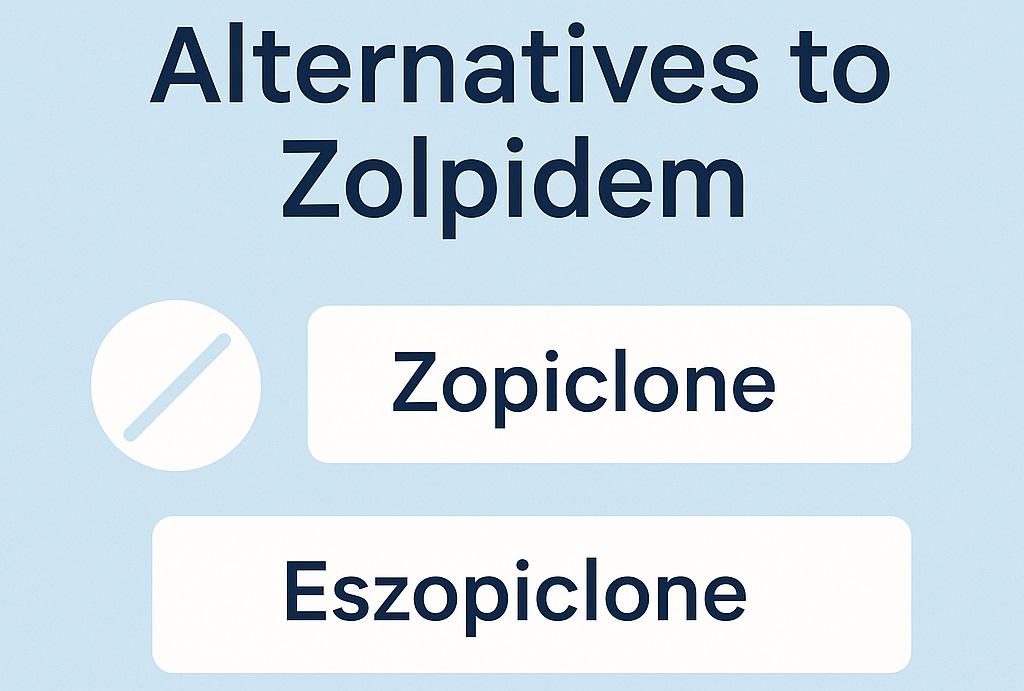Zolpidem — better known by its brand names like Ambien, Stilnox, and others — is one of the most commonly prescribed medications for insomnia. It’s popular for its rapid onset and short half-life, which help patients fall asleep quickly without too much next-morning grogginess. However, not everyone tolerates zolpidem well. Some patients experience side effects such as sleepwalking, memory issues, dependence, or morning drowsiness. Others simply find that it stops working effectively over time. If you’re looking for alternatives to zolpidem, there are several medications worth considering — including two of its close cousins: zopiclone and eszopiclone. Below, we break down the best options and who they might work for.
Why Look Beyond Zolpidem?
While zolpidem is effective for many, it comes with drawbacks:
- Risk of dependence and tolerance after weeks of use.
- Strange sleep behaviors (e.g., eating, driving while asleep).
- Grogginess or brain fog in some patients.
- Ineffectiveness for people who wake frequently at night (due to its short duration).
For these reasons, doctors may recommend switching to another medication that better suits your needs or is better tolerated.
Best Alternatives to Zolpidem
1. Zopiclone
Zopiclone is a non-benzodiazepine hypnotic — like zolpidem — and is often called a “Z-drug.” It’s widely prescribed in Europe, Canada, Australia, and elsewhere, but not FDA-approved in the U.S. It has a similar mechanism of action, enhancing GABA receptors to calm brain activity and induce sleep.
Why Consider Zopiclone?
- Slightly longer half-life (about 5–6 hours) than zolpidem, making it a good choice for sleep maintenance as well as sleep initiation.
- Some people find it less likely to cause odd sleep behaviors.
- Well-tolerated for short-term use.
Downsides:
- Can cause a metallic or bitter taste in the mouth.
- More likely to cause morning grogginess than zolpidem.
- Not approved in the U.S., so access is limited.
2. Eszopiclone
Eszopiclone (brand name Lunesta) is essentially the S-enantiomer of zopiclone. It was developed to offer the benefits of zopiclone with fewer side effects and is FDA-approved for insomnia in the U.S.
Why Consider Eszopiclone?
- Longer-acting than zolpidem IR, making it a strong option for patients who wake during the night.
- Less bitter aftertaste compared to zopiclone.
- Approved for longer-term use than zolpidem (though still typically recommended for short-term use).
Downsides:
- Can still cause morning drowsiness at higher doses.
- Potential for tolerance and dependence over time.
3. Other Prescription alternatives to Zolpidem
If neither zopiclone nor eszopiclone is right for you, there are other medications sometimes used to treat insomnia:
- Temazepam (Restoril): A short-acting benzodiazepine, effective but with higher dependence potential.
- Ramelteon (Rozerem): A melatonin receptor agonist, less potent but no abuse potential.
- Doxepin (Silenor): A low-dose tricyclic antidepressant with sedating effects.
- Trazodone: An antidepressant often prescribed off-label for sleep.
These may be better suited for specific situations, such as in patients with a history of substance abuse or when non-habit-forming options are preferred.
Zopiclone vs. Eszopiclone: Which Is Better?
| Feature | Zopiclone | Eszopiclone |
|---|---|---|
| Approval in U.S. | ❌ No | ✅ Yes |
| Duration of Action | ~5–6 hours | ~6–7 hours |
| Taste Side Effect | Common (metallic) | Less common |
| Next-Morning Grogginess | Moderate | Moderate (dose-related) |
| Best For | Sleep maintenance | Sleep initiation + maintenance |
If you’re in the U.S., eszopiclone is the practical choice. If you’re in a country where zopiclone is available, either can work, though some people find eszopiclone more tolerable at similar doses.
Finally
While zolpidem is a go-to treatment for insomnia, it’s not the best fit for everyone. Zopiclone and eszopiclone stand out as the most similar and effective alternatives to zolpidem, offering longer duration and potentially better control over middle-of-the-night awakenings. Other options like ramelteon or doxepin may suit those who want non-habit-forming therapies.
Always consult your healthcare provider before switching medications. The right choice depends on your specific sleep challenges, health history, and how your body responds.

